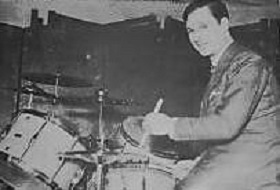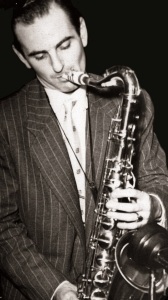










          |
| The War years (1940 - 1945)... |
 |
|
The comments on this page have been adapted from the book "Jazz at Ronnie Scott's" by Kitty Grime, published in 1979 by Robert Hale... Tony Crombie "In 1939/40 I started playing the drums in a nearby pub, although I was only 14+ I was tall and able to get in. Then a year later I ran into Denis Rose. He was already professional in the West End with Happy Blake's band at the Cuba club. Every Sunday morning in Petticoat Lane market there was a record stall - about one jazz release a month - we used to gather there, to be on the scene was important and I ran into Denis there. He was dressed in a long black herringbone overcoat, black and white promenade shoes (very pointed), black homburg hat and flour white face. I was intrigued we struck up a friendship and he invited me down to the club with him - I played with the band and it just went on from there". "In 1941 there were at least 50 clubs in Soho, probably more - bottle clubs where you were supposed to order drinks in advance - nobody obeyed the law. I worked in a first floor club all through the air raids - no stopping for bombs. People were fatalistic but tremendously happy - everybody had the feeling that death was on the doorstep so they all had a good time. As I walked back to Aldgate at 3 or 4 in the morning the whole of the City of London would be alight. We walked on through it almost every night, bomb stories were two a penny. It wasn't bravery there was nothing you could do about it - it just went on night after night". "After the early war year bombs there was another bad patch in 1944 with buzz bombs (V2s) which were the worst of the lot. It was a terror thing, pure chance - it's hard to believe the small amount of food you lived on. In the clubs there was money and food. There ws the open black market, if you had money something would appear from under the counter. There was a lot of boozing and an influx of Americans who had money to burn. You'd get the occasional Sir or Lord, but mostly it was servicemen on leave. The music was all jazz, every club featured jazz. Musicians were walking round the west end all night, pop in a club and play for half an hour and move on. You got a lot of experience in a little while. People danced to whatever you played". "You'd play one chorus and the rest of the guys would pick up something to, you know, heighten the thing. Riffs. It suited the moment. It was exciting, get up and solo. It was all jazz. Some of the tempos were tremendous because of the jitterbug thing, which was on, and the faster it went the better they liked it. All those arms and legs, bodies zooming round, tremendous. It's never been repeated since". "We got very involved with the musicians from Sam Donahue's band, I got more advice, actual advice when that band was in London than I ever had before or since. I was in the Army, it was dismal. I was in the station band and a lavatory attendant in the daytime. I got a job at the Bouillabaisse for about a year then it became Fullado". Kathy Stobart "The wartime tradition was that the band always played on. I worked in a club and all of a sudden you would hear this whistling sound - wheesh - and everybody, the entire place just tensed up. There was no time to do anything. Everyone's face turned like block of ice - then the blast would go somewhere else. And they'd all just start talking again". "I just waltzed through the West End, any time of night, saxophone case in hand, alone! Five o'clock in the morning perhaps with bombs falling all around. It was nothing to do with bravery, I wasn't scared. The worst thing was watching the doodlebugs on a clear day.What looked like a toy aeroplane, hear this particular sound like a motor bike pop, pop, pop and you knew you were actually watching death". Carlo Krahmer  "The West End was rotten with jazz in the war years, little clubs came and went. I first saw Kathy Stobart in 1943 and she was a knockout, a sensation. Girl of eighteen playing all the tunes of the day 'Perdido' 'I got rhythm' she went through them like a whistle".
"The West End was rotten with jazz in the war years, little clubs came and went. I first saw Kathy Stobart in 1943 and she was a knockout, a sensation. Girl of eighteen playing all the tunes of the day 'Perdido' 'I got rhythm' she went through them like a whistle"."The jazz was good because the musicians were playing for themselves. The owners didn't mind, they didn't have to pay people who just sat in for a blow. I first met Ronnie Scott about late '42, he sat in for a blow, he had a good sound - sounded promising. Said he'd been around the East End , thought he'd come up West and have a blow. Then I got this dep job for him. The first week he knew nothing, blew what he could, but he had a big healthy sound. Played as well as you'd expect a young player without much experience in club work. You had to know all the tunes and the keys, you know, but he learned fast". Kathy Stobart... Carlo Krahmer... Ronnie Scott... Don Rendell... Johnny Claes... Coleridge Goode... Laurie Morgan... |
Ronnie Scott "I was in Brighton when the war broke out and came back to London after it had been on for a year. There were air raids but when your fifteen your kind of immortal anyway. In 1941 we used to make forays into the West End. At first we just hung around talking to the musicians and spent the rest of the night in Lyons Corner house until the tubes started running in the morning. After a year or two we started to sit in. they'd play Honeysuckle Rose and you knew that one. I was maybe fifteen, sixteen, London was very, very swinging then".
"I was in Brighton when the war broke out and came back to London after it had been on for a year. There were air raids but when your fifteen your kind of immortal anyway. In 1941 we used to make forays into the West End. At first we just hung around talking to the musicians and spent the rest of the night in Lyons Corner house until the tubes started running in the morning. After a year or two we started to sit in. they'd play Honeysuckle Rose and you knew that one. I was maybe fifteen, sixteen, London was very, very swinging then". "The clubs weren't really rough places but they were very dim. In daylight they looked horrible. But they weren't posh places, you got hoods and servicemen, guards officers that sort of thing. There's no equivalent now, certainly not as far as the music goes. They used to have jazz bands because people didn't care as long as they could get up and stumble round the floor". "Then the Sam Donahue Band were in town. It had been the Artie Shaw Band. Marvellous sound like you never heard before. British bands didn't know about that sound. Then there was the Glenn Miller Band. I heard their only public concert, one of the great experiences. Our little clique got friendly with some of the players". "The first music job I ever had was with Carlo at the 'Jamboree' in Wardour Street. I'd been playing about nine months when Carlo said 'do you want to do this dep job for three weeks?' I said 'I can't play'. He said 'You don't have to - all you have got to do is sit there with the saxophone'. Well I wasn't even miming I just turned up and sat there. I just used to sit there and mumble - but it was a marvellous feeling and I started to listen to jazz more than the dance band things. Then I got a job at the ' Bouillabaisse, which was a West Indian club in New Compton Street, with Clarry Wears. Then in 1943 the 'Bouillabaise' closed - clubs did that all the time. I was about sixteen when I did an audition for the Johnny Claes Band. The thing was I couldn't read - never been much of a reader. I couldn't really play jazz to any degree. Johnny was very nice to me, he said ' we really need someone who can read which was a nice way of putting it because I just couldn't play". "In 1944 when I was seventeen I did join Johnny and went on the road for the first time ever. Denis Rose was in the band, played second trumpet. We used to get V discs and Denis took things down off them. It was a forward looking band". Coleridge Goode "In wartime you had to go from day to day hoping to get through. You heard the bombs - tomorrow it could be you. People were just happy to be alive, you valued life a bit". "There's some things you never forget: first time I saw Kathy (Stobart). This absolutely gorgeous, tall blonde girl, playing jazz like one of the boys". "The damage just accumulated, everything just lay there in heaps, nothing was repaired. As if it would never stop. You never starved, you just usually felt hungry. But you know people were healthier, I think. One ounce of butter a week - you had a choice whether you eat it all in one go or spread it out". "Gangsters like Jack spot were regulars at the 'Slip In' . They were favourites of the musicians because they always looked after us - big tippers. You always had gangsters in clubs. Every other American serviceman who came in said he'd played with Benny Goodman - never had an instrument of course!" "Clarry Wears was a Latin king, a gig king of the time. Everybody knew Clarry Wears - nice player, nice bands. I came to London in 1942 - then Johnny Claes hired me, I never expected to get so soon into the best little swing combo of it's day. So many of the good British sax players went through that band. It really swung and everyone was so jazz orientated". Don Rendell "It was a very important stage for young musicians, actually hearing Sam Donahue's band in 1945 and getting to play with him and the musicians. This was down at the 'Nuthouse' where Carlo Krahmer had a band. After hours all the musicians who cared tried to get there. Tremendous sessions. The Musicians Union ban on American players had been on since the early '30s. Till the Service bands came through we were out of touch with what was happening in the US. Never heard anything with the power of the Sam Donahue band, and Sam was a fair old giant on sax". "I used to play at the Bouillabaisse. It was basically a coloured club. Musicians used to jam there all day from about three in the afternoon". Laurie Morgan "Denis Rose was pure Victorian - born out of his time - should've been with the gaslights and hansoms - like something out of Dickens". |